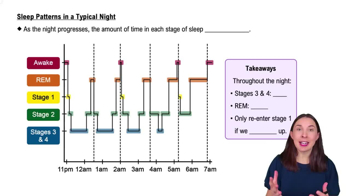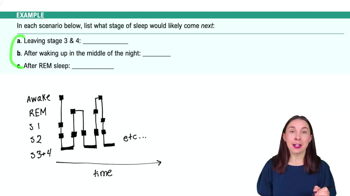Table of contents
- 1. Introduction to Psychology1h 43m
- 2. Psychology Research2h 20m
- 3. Biological Psychology2h 41m
- 4. Sensation and Perception28m
- 5. Consciousness and Sleep32m
- 6. Learning41m
- 7. Memory34m
- 8. Cognition37m
- 9. Emotion and Motivation35m
- 10. Developmental Psychology33m
- 11. Personality48m
- 12. Social Psychology41m
- 13. Stress and Health41m
- 14. Psychological Disorders44m
- 15. Treatment47m
5. Consciousness and Sleep
Sleep
Struggling with Psychology?
Join thousands of students who trust us to help them ace their exams!Watch the first videoMultiple Choice
Which of the following parts of the body controls the sleep-wake cycle?
A
Hypothalamus
B
Pituitary gland
C
Thyroid gland
D
Prefrontal cortex
 Verified step by step guidance
Verified step by step guidance1
Understand the sleep-wake cycle: The sleep-wake cycle is a daily pattern that determines when we feel sleepy and when we feel alert. It is influenced by various biological processes and environmental factors.
Identify the role of the hypothalamus: The hypothalamus is a small region of the brain that plays a crucial role in many bodily functions, including the regulation of sleep and wakefulness.
Explore the function of the suprachiasmatic nucleus (SCN): Within the hypothalamus, the SCN acts as the body's internal clock, helping to regulate the timing of the sleep-wake cycle by responding to light cues.
Differentiate the roles of other glands: The pituitary gland, thyroid gland, and prefrontal cortex have different primary functions, such as hormone regulation and cognitive processes, which are not directly responsible for controlling the sleep-wake cycle.
Conclude with the correct answer: Based on the understanding of the hypothalamus and its role in regulating the sleep-wake cycle, identify it as the correct answer to the problem.

 3:25m
3:25mWatch next
Master Circadian Rhythms with a bite sized video explanation from Hannah Gordils
Start learningRelated Videos
Related Practice


































































































![Race, Genes and IQ Differences | Bret Weinstein [Mini Clip]](https://img.youtube.com/vi/IztL_m3pd70/mqdefault.jpg)



































































































